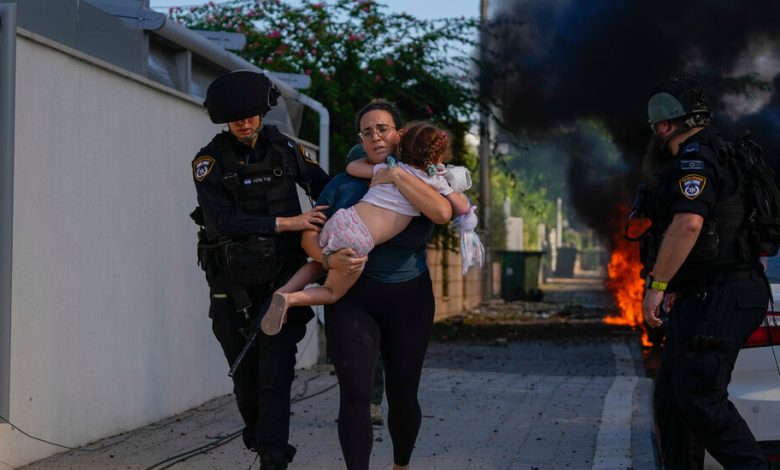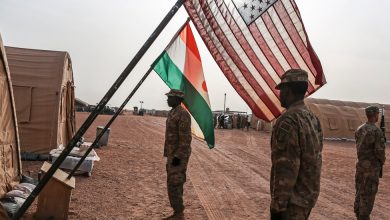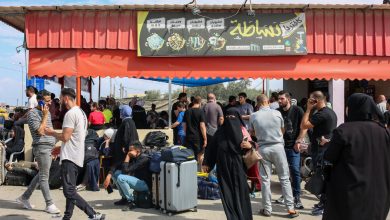‘The Children Were Terrified.’ Fear Grips Israel and Gaza

Israeli citizens, barricaded in their homes in towns near the Gaza Strip, called into television stations as Palestinian gunmen crossed the border into Israel and invaded their communities on Saturday morning. The Israelis spoke in whispers as they pleaded desperately for help.
One woman named Doreen told Israel’s Channel 12 that militants were in her house in Nahal Oz, a small rural community, and that she was hiding in a safe room. “My husband is holding the door of the bomb shelter,” she said. “Now they’re shooting sprays of bullets at the bomb shelter’s window. Sprays. And my three children are here with me.”
On the other side of the border in Gaza, Jamila Al-Zanin, 39, tried to distract her own three children as they fled their home and drove south.
“The children were terrified. As we drove down they were looking left and right, everywhere there were explosions and booms,” she said. “They were hysterical.”
“This is the first time in our history something like this has happened,” she added, referring to the Palestinian attack.
Panic, disbelief and fear rippled throughout Israel and Gaza, as Palestinian militants on Saturday morning caught Israel off guard with a broad and coordinated assault — reaching 22 Israeli towns and army bases, and abducting civilians and soldiers. They fired thousands of rockets that reached as far away as Jerusalem and Tel Aviv.
By late Saturday evening, gunfights were still raging between Palestinian militants and the Israeli military, which sent fighter jets to attack targets in Gaza. At 8:30 p.m., at least 100 Israelis had been killed and more than 900 wounded — numbers that had been rising through the day. The health ministry in Gaza reported that 198 Palestinians had been killed and more than 1,600 inured.
As world leaders condemned the attacks — and questions arose about how Israeli intelligence had been so surprised — ordinary citizens tried to make sense of what was happening.
In Sderot, an Israeli city close to the Gaza border, videos and photographs verified by The New York Times showed multiple casualties and the taking of civilian hostages.
Mike and Adele Rubin, a couple in their 90s, were huddled in their home in Sderot with their doors locked, watching reports on television about gun battles unfolding in the streets not far away. They couldn’t hear the gunfire because of the noise from sirens warning of incoming rocket fire, and from Israeli fighter jets flying to bomb targets in Gaza.
“I don’t think anybody can describe what’s happening,” Mr. Rubin said by telephone. “From what we heard on television,” he added, “a building about 150 meters from our house” had come under attack.
The attacks on Israel were celebrated in parts of Lebanon’s capital, Beirut, with children handing out candy to passing motorists, and residents waving Palestinian flags and setting off fireworks. Convoys waving Hezbollah flags also drove through towns on the Israeli-Lebanon border on Saturday, videos posted by local media show.
In late morning, some Palestinian fighters from armed groups that took part in the attacks, including Hamas and Palestinian Islamic Jihad, returned to Gaza, and some residents gathered to celebrate them. Many hailed the attacks as a just response to years of Israeli occupation, and the blockade of the Gaza Strip by Israel and Egypt.
“This is a big surprise for our people in Gaza and our people in the West Bank and our people in Jerusalem,” said Ahmed Amro, as he watched people greet the returning militants.
Referring to periodic Israeli raids on the Aqsa Mosque compound in Jerusalem and increasing Jewish worship at the site, which is sacred to Muslims and Jews, he added, “This came as a surprise to liberate the Aqsa Mosque from the violations of the occupation.”
But many others in Gaza said they feared the Israeli response, which begun during the day with huge strikes on Gazan cities. The streets of Gaza City were mostly empty as residents braced for an intensification. Supermarkets and bakeries were busy, though, as people flocked to supermarkets, shops and pharmacies to stock up on supplies. Schools suspended classes across the Gaza Strip, and students were sent home. Some Gazans began to shelter in schools.
Schools in Israel will also be closed on Sunday, the country’s education ministry announced.
Throughout the day, scenes of the violence in Israel were shared on social media and shown on television as Israeli officials called on residents near Gaza to stay in their homes. Witnesses posted videos online showing a group of at least seven Palestinian gunmen driving through Sderot in a white truck, at one point opening fire on an Israeli police vehicle.
A video showed the bloodied bodies of 10 men and women in civilian clothes at a highway intersection and inside bullet-ridden vehicles on the southern outskirts of Sderot, just a couple of miles away from the Erez crossing into Gaza. Another video showed hostages begin taken at a kibbutz in the south.
In Jerusalem, sirens sounded numerous times in the center of the city, followed by loud booms. It was initially unclear if any rockets had struck the city or if the booms were caused by Israel’s aerial interceptions of the incoming rockets by its Iron Dome antimissile defense system. But one witness said rockets had struck in the wooded hills on the western edge of Jerusalem.
Saturday’s attack came 50 years and a day after invading forces from Egypt and Syria caught Israel off-guard, setting off a 19-day war with Egypt, Syria and other Arab states that has long traumatized the nation.
Israeli television channels and newspapers have been filled in recent days with commemorations of that attack, the Yom Kippur War, so named for the holy day on which the 1973 conflict began. The Israeli military was caught by surprise then too, but ultimately pushed Egyptian forces back in a stunning reversal.
By Saturday evening, the continuing battles added to a nationwide sense of colossal government and military failure, and chaos. Dazed young Israelis, some of them injured, were still hiding in bushes and orchards as evening approached, stranded after an all-night nature party in a nearby forest.
One of the partygoers, named Ortal, described on Israeli television seeing about 50 gunmen in pickup trucks spraying people trying to flee on foot with bullets, shooting the tires of cars and firing on those stuck inside.
Adele Raemer, a resident of Nirim, a small community about a mile from the Gaza border fence, told reporters in a brief call, “Nothing like this has ever happened on our kibbutz.”
“There are still terrorists in our community,” she added, speaking as dusk fell. She said that it took about seven hours for Israeli troops to arrive, and that they were working their way through the kibbutz, house by house, bringing residents to a safe gathering point.
“We had two minutes to leave,” she said, adding that she grabbed some medication that she cannot do without, her wallet and shoes. “We literally ran for our lives,” she said.
In Gaza, Um Mohammad Abu Jaraad, a 35-year-old mother of five, said she fled her home with her children, who were screaming from the sounds of the blasts, without taking anything with them, and went to her parent’s home farther south in the Gaza Strip.
“We are exhausted, every war is like this,” she said. “Every war we flee from home to home.”
Isabel Kershner reported from Jerusalem and Raja Abdulrahim reported from Istanbul.





